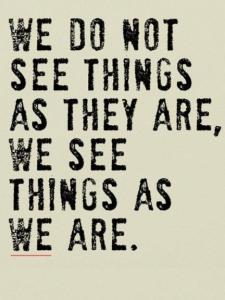
I do not like the word Overreacted.
What does it mean, really?
So, your reaction did not fit the level of the situation. OK, fine. We’ve all been there. And, it’s likely we will be there again. But, it has such a bad connotation and it’s a connotation that I usually hear in regard to women, and it can sound the same as, “She’s so emotional.” Eye-roll.
When did having emotions become such a bad thing?
I hear a lot of women apologize for having expressed some emotion and I say, “Great, you’re ALIVE!” But maybe you need more reassurances than that?
OK, let’s break it down then.
The word reaction, as defined by dictionary.com, is:
- action in response to some influence, event
- action in response to a stimulus, as of the system or of a nerve, muscle, etc.
- the action caused by the resistance to another action.
- a return to the opposite physical condition, as after shock, exhaustion, or chill.
The word respond, as defined by dictionary.com, is:
- to reply or answer in words: to respond briefly to a question.
- to make a return by some action as if in answer: to respond generously to a charity drive.
- to react favorably.
- to exhibit some action or effect as if in answer- to correspond
As I understand it, the difference between the two definitions is the addition of emotional influence when reacting. Reaction is biological and response is thought out. Of course we would all love to respond to situations instead of react to them, but that is not always realistic.
Emotional reactions are part of being human. They are closely connected to our survival skills. When danger or a threatening presence is near we usually react in one of three ways: fight, flight or freeze. So, if someone presents us with something that our psyche perceives as a threat, we react. Just because someone doesn’t have the same perception of what a threat is doesn’t mean the threat is not totally real for the person who perceived it.
The word overreact, as defined by dictionary.com, is:
- To react or respond more strongly than is necessary or appropriate.
Who determines what is necessary or appropriate?
I have seen people l o s e t h e i r s h i t.
I have lost my shit.
It can be shocking to an outsider who witnesses an exchange and then sees someone “over” react. And, honestly, there is a part of me that is embarrassed for the person when I witness someone “over” react, because I don’t like it when I lose my shit and seeing them lose theirs just reminds me of my own shit-losing. That’s my shit.
But, there is NOT ONE TIME that I have lost my shit that I haven’t been able to find some deeper reason, some long-time trigger, and some opportunity to get to know myself better.
My mother died when I was eight. My father left us shortly after. It’s an understatement to say that I have some abandonment issues. Today, 31 years later, if someone I care for gives me some indication they are going to bail, I lose my shit. My shit looks like a defensive-overly-angry-f-you-kind-of-shit-losing, so to an outsider who knows nothing about me, it could easily be perceived as an “over” reaction.
I never knew I had abandonment issues. I went through my life thinking I was fairly unscathed by the tragedies of my youth. HA! I sure fooled me!! It wasn’t until I completely overreacted to a situation, and then again and again to similar situations, that it was brought to my attention.
Why was I reacting so aggressively in these situations?
What is the pattern?
It forced me to pay attention. Now, when I “over” react to something, I can stop and ask myself these questions because I know that there is something deeper going on.
As Julia Cameron says, “Anger is our friend. Not a nice friend. Not a gentle friend. But a very, very loyal friend. It will always tell us when we have been betrayed. It will always tell us when we have betrayed ourselves. It will always tell us when it is time to act in our own best interest. Anger is not the action itself. It is the action’s invitation.”
For me it’s an indicator that there is something I am holding in or some reassurances that need to be made. It was from my “over” reactions that I was able to address the root of the issue with the people who matter most to me which just created a newer, deeper level of intimacy and trust with them.
And, even more amazingly, when I see someone else “over” react to a situation, instead of judging them, I am able to meet them with some compassion. I know they have just been triggered in some deeply painful way that has yet to be discovered. This understanding supports me in being able to speak the fear that’s behind the reaction instead of the displaced emotion in front of it. As you can imagine, having that approach to someone in the midst of an emotional outburst is powerful and often times defusing.
Think of a recent time that you felt like you “over” reacted to something.
- Are you able to find the very specific moment, word or action that triggered you?
- Can you find a pattern of reacting to that trigger (or similar one)?
- Can you think of what might be underneath it?
Answering these questions will set an alarm in your head, so the next time this trigger is activated, you will remember what you have come up with in your answers. Then you can choose to course correct and, with time, evolve into something that is less reactionary and more responsive.

